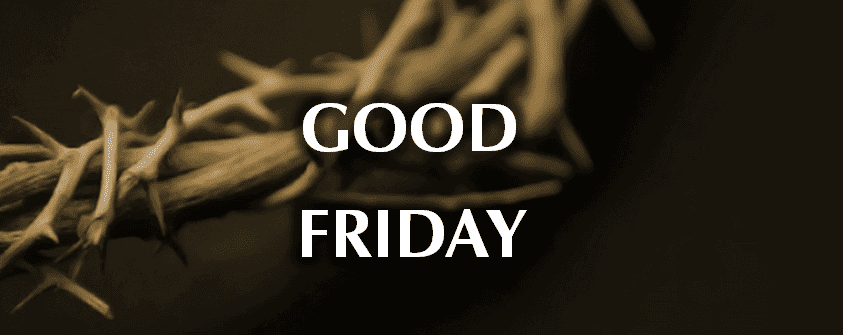Do you love to truly worship your Savior? I love to lead worship, and I preach from time to time – Good Friday is one of those days. Here is what I shared this year.
Good Friday 2023
Matthew Chapter twenty-one tells us that Passover week began on a day we remember as Palm Sunday. The religious leaders were already having issues with Jesus’ teaching, but His entrance that day had to raise their anxiety to a new level. Up until now the people had called Him a great teacher, rabbi, an honorable man. But when the people started calling for Him beside the road on Palm Sunday, it had to disturb the religious leaders even more.
Matthew 21: 9 tells us they called out Hosanna to the Son of David. Blessed is He who comes in the name of the Lord.
Every word of their worship would have made the Pharisees and Sadducees’ blood boil.
“Hosanna†is Hebrew – it means save us and save us now.
Then they called Jesus The Son of David. That was a direct reference to the Messiah. There is no one else that Jews would have called the Son of David. These people believed Jesus was the blessed Messiah sent in the name of the Lord to save them!
With a Messiah to lead them, these people thought they could overthrow the government. Even the Jewish leaders knew there wouldn’t be enough war horses to stop them. There only option was to kill the ringleader.
Five times that week the leaders tried to trap Jesus into saying something that would prove to the crowd He deserved death, and five times Jesus answered with scripture or a question. Then He called them a den of vipers. Pretty sure that didn’t go over too well.
So, these leaders crafted a plan to kill Him, but let me share with you my favorite part of their plan:
3 Then the chief priests and the elders . . . schemed to arrest Jesus secretly and kill him. 5 “But not during the festival,†they said, “or there may be a riot among the people.†Matthew 26:3-5
. . . Not during the festival. The last thing those leaders wanted was Jesus to become the center of attention during their sacred holiday. They had no idea they were planning to crucify the final Passover lamb. What’s more, they didn’t realize they had no control over the date and time of the Messiah’s death. They may have facilitated it. They may have wanted Him dead, but they were working on God’s time not their own.
Good Friday’s First Lesson
The first lesson we learn from Good Friday is that God will use even His enemies to accomplish His plans. He’ll let them have their own way. They can be destructive and deadly, but when the person they harm is a child of God, the Kingdom will still be glorified. The enemy hates it, and despite the fact God has proved Himself over and over, it still happens.
God allows abusers and horrendous men and women to have their way. He gave them free will, but at the end of the day, if the people that are harmed are Children of God, the Kingdom will be glorified. The enemy may try to use cancer and other diseases to destroy the people created in God’s image, but every time He messes with a child of God, it backfires because the Kingdom of God is glorified.
Jesus shows us that despite the horrific things the enemy wants to do, if we worship Him, the Kingdom will be glorified. Jesus was determined to do God’s will even if the enemy planned to kill Him because He knew God would win in the end. We can’t keep bad things from happening, but when we love Him, God will work them for good and He will get the glory every single time.
What I really want to talk to you about tonight are the men who catch our attention as people who the enemy used to destroy our Savior. The enemy used Pilate and Herod, Annas and Caiaphas the priests, the soldiers, the thief who cursed Him on the cross, and even the crowd that yelled crucify.
But the three men that really stand out that day were apostlesâ€â€three of Christ’s disciples demonstrate the types of disciples we can become.
Which Disciple Are You?
I want to start with Judas. I wonder what he thought about Palm Sunday. Many think those crowds with branches might have spurred him to betray Jesus. Maybe he hoped all those followers would rush the palace or the temple if the soldiers took Jesus. Even the priests were afraid something like that might happen. Judas could have allowed events to happen on their own, but Judas was tired of waiting on a conquering king, so, Judas made a choiceâ€â€a bad choice. But let’s read about it.
Matthew 26:14-16:  14 Then one of the Twelveâ€â€the one called Judas Iscariotâ€â€went to the chief priests 15 and asked, “What are you willing to give me if I deliver him over to you?†So they counted out for him thirty pieces of silver. 16 From then on Judas watched for an opportunity to hand him over.
And then we skip down to verse 47 and we find the disciples and Jesus in the Garden. Judas hadn’t gone with them because he left the Passover Supper early.
Judas, one of the Twelve, arrived. With him was a large crowd armed with swords and clubs, sent from the chief priests and the elders of the people. 48 Now the betrayer had arranged a signal with them: “The one I kiss is the man; arrest him.†49 Going at once to Jesus, Judas said, “Greetings, Rabbi!†and kissed him.
50 Jesus replied, “Do what you came for, friend.â€Â
Then the men stepped forward, seized Jesus and arrested him. 51 With that, one of Jesus’ companions reached for his sword, drew it out and struck the servant of the high priest, cutting off his ear.
52 “Put your sword back in its place,†Jesus said to him, “for all who draw the sword will die by the sword. 53 Do you think I cannot call on my Father, and he will at once put at my disposal more than twelve legions of angels? 54 But how then would the Scriptures be fulfilled that say it must happen in this way?â€Â
And that is how Judas betrayed Jesus. Those soldiers weren’t even sure what Jesus looked like; Judas had to point Him out. His popularity with the people frightened the Sanhedrin, but they couldn’t pick Him out of a crowd. Most remarkbly, Jesus still called Judas friend, even after he made Jesus out to be a criminal.
Have I Ever Betrayed Jesus?
Judas leaves us with the question, “Do I betray Jesus?†We betray Jesus when we act like His friend and wish evil on His children. We betray Jesus when we say we hang out with Him but treat the people created in His image like criminals. We betray Jesus when we carry out our will instead of His.
I know you have people in your life that keep hurting you, they continually bad mouth you or treat others poorly. You can’t find anything good to say about them or find it in your heart to treat them well. There is something to be said for Thumper Theology. If you can’t say nothin’ nice-don’t say nothin’ at all. And you could take that one step further. If you can’t do nothin’ nice- don’t do nothin’ at all.
We can’t worry about what others do, only what we do.
But there’s good news! If you’ve betrayed Jesus, it’s not the end of your salvation. You can put all those betrayals behind you. You do not have to let them define you.
Unfortunately Judas did just that. Not only did he let the betrayal define him, it became his most famous deed.                                                                                                                             He took his own life instead of accepting the way out Jesus offers. Judas felt horrible about what he did, but he obviously hadn’t been listening closely when Jesus taught. The disciple thought he had sinned beyond redemption, and that’s not ever true.
King David would tell youâ€â€he lusted, committed adultery, lied, murdered, covered up the murder, and brushed it all under the carpet until Nathan called him out. But then the great king repented and brought glory to the Kingdom of God.
Judas hadn’t figured out that no matter how far we fall, if we repent, turn back to Jesus, and love Him, He will work it all out for good. No matter how hard the enemy tries, when we repent, God is glorified.
Instead, He fell into the trap of the people of Isaiah’s time:
These people come near to me with their mouth
    and honor me with their lips,
    but their hearts are far from me.
Their worship of me
    is based on merely human rules they have been taught. Isaiah 29:13
When Matthew quoted Isaiah, he said, “They Worship me in Vain.â€Â
When we refuse to repent, our worship is in vain; it’s worthless. Worship from an unrepentant heart won’t get us to heaven, it won’t even bring us the joy, peace, and abundance Jesus promised.
Judas worshipped in vain.
 Did Peter Worship in Vain?
But I told you I had three apostles I wanted to talk about. What about Peter? He let Jesus down on Good Friday, too. He didn’t go so far as to betray Jesus, but did you notice that a guy got his ear cut off in the Garden? Yeah, that was Peter with the sword. He thought he was helping, but Jesus rebuked him. Can you imagine the let down? All that adrenaline flowing, they’re taking away your friend, mentor, and the man you know will save Israel, so you react. Sword in hand, ear nearby, you strike. Seems reasonable; however, Jesus wasn’t having it.
Jesus had warned them this day was coming. He had told them at least three times prior that He would be handed over to the priests and be killed. He had basically told them that He had taken charge of His death and they should expect it. Jesus wanted them to be prepared. But Peter was a react kind of guy. Anyone here like that? You live in the moment and don’t always think things through? That’s how Peter got himself rebuked in the Garden and it’s how he fell into a predicament right outside the governor’s mansion.
Judas’ plan had backfired. No one stormed the palace, everyone ran for the hillsâ€â€except Peter and John. John had friends on the inside, so he left Peter in the courtyard while he tried to help Jesus. He’d lived in obscurity all his life, a fisherman who became the disciple of a man that Judas had to single out in a crowd. He didn’t think anyone would notice him.
Until they did:
Matthew 26:69-75
69 Now Peter was sitting out in the courtyard, and a servant girl came to him. “You also were with Jesus of Galilee,†she said.
70 But he denied it before them all. “I don’t know what you’re talking about,†he said.
71 Then he went out to the gateway, where another servant girl saw him and said to the people there, “This fellow was with Jesus of Nazareth.â€Â
72 He denied it again, with an oath: “I don’t know the man!â€Â
73 After a little while, those standing there went up to Peter and said, “Surely you are one of them; your accent gives you away.â€Â
74 Then he began to call down curses, and he swore to them, “I don’t know the man!â€Â
Immediately a rooster crowed. 75 Then Peter remembered the word Jesus had spoken: “Before the rooster crows, you will disown me three times.†And he went outside and wept bitterly.
Three times Peter says, “I don’t know Him.†And the minute the rooster crows, he realizes what he’s done.
Have I Ever Been Like Peter?
When we consider Peter, we have to ask, “When have I denied Christ?â€Â
What does it mean to deny Christ? Well, The parables that Jesus told just before Good Friday gave excellent clues. You’ll find them in Matthew 25 if you want to read them later.
He told a story about ten virgins waiting for the Bridegroom, but only five brought enough oil to wait it out. The others denied the Bridegroom. They didn’t really believe he was coming, they didn’t worship him, so they didn’t prepare. When we don’t prepare for Jesus’ coming by growing spiritually and helping others find salvation, we deny Christ.
The second parable included three men who got gold from their masterâ€â€this gold is called talents in some versions. Two used their gold to grow the Master’s Kingdom. The third buried his. He didn’t think he could really do anything to enhance the kingdom. He didn’t believe the Master trusted him. When we don’t recognize, embrace, and use our talents for Christ, we deny Him. If you have ever said, “I don’t I have any talent God could use,†or “God didn’t give me any gifts,†what you really said was, “I don’t know who that man is who calls Himself the Christ.â€Â
Third, Jesus shared a parable about sheep and goats. The sheep cared for people without even realizing they were doing anything for Jesus. The goats refused to help anyone but themselves. Jesus said the goats denied Him. If you worship Christ, then you know how He wants you to treat others. If you don’t care for other people like Jesus cared about them, then you deny that you know Him.
But, denial is not the endâ€â€betrayal is not the end. One is not worse than the other.
We hear a lot about Peter and Judas. No one wants to be like Judasâ€â€he refused to repent and then ended his own life. His greatest sin was not the betrayal. His biggest mistake was not repenting. If he had taken that remorse that he felt and brought it before Jesus, he could have been restored. He didn’t believe Jesus when He said, “Tear down this temple and I’ll rebuild it in three days.†He obviously wasn’t paying attention when Jesus said for the third time,ÂÂ
“We are going up to Jerusalem, and the Son of Man will be delivered over to the chief priests and the teachers of the law. They will condemn him to death 19 and will hand him over to the Gentiles to be mocked and flogged and crucified. On the third day he will be raised to life!â€Â
If Judas had trusted and worshipped Jesus, he would have waited at least three days to kill himself. But he didn’t believe the things Jesus said about the resurrection and forgiveness. Our greatest mistake in life is not believing the things that Jesus has said.
More of us are like Peter. We mess up. In the heat of things, dcwe act spontaneously and say things we regret later. But Peter showed us the power of repentance. He felt horrible about what he’d done, and later, Jesus restored Him. Peter let the Holy Spirit lead him, and the fisherman became a leader in the church. No matter what you’ve done, Jesus can use a repentant heart. That’s all He needs.
The Disciple that Worshipped
But there’s a third guy, and I’ll be honest with you, I would really like to be like himâ€â€John. John went with Peter to the Palace, but instead of denying Christ, he went inside and associated himself with Jesus. Yes, he had friends on the inside, so that might have made it easier; however, it still took courage. Those guys had no idea if they’d be the next to die.
Then John followed the crowd to the cross. I wonder if he witnessed the flogging, too.
Matthew 27 describes it:
26 Then Pilate released Barabbas to the crowd. But he had Jesus flogged, and handed him over to be crucified.27 Then the governor’s soldiers took Jesus into the Praetorium and gathered the whole company of soldiers around him. 28 They stripped him and put a scarlet robe on him, 29 and then twisted together a crown of thorns and set it on his head. They put a staff in his right hand. Then they knelt in front of him and mocked him. “Hail, king of the Jews!†they said. 30 They spit on him, and took the staff and struck him on the head again and again. 31 After they had mocked him, they took off the robe and put his own clothes on him. Then they led him away to crucify him.
All the other apostles had disappeared by now. Only John remained. I can’t imagine watching all of this, but I know that I want to be there for Jesus when He’s being mocked and beaten.
I want to be like John. He stood beside Jesus’ mother and comforted her while she watched her Son die. And let’s face it. Even if you believe your friend when He says He will be back in three days, it’s hard to watch someone you care, the person you worship, be flogged, nailed to a cross, and struggling to breathe as they die. John was the only one of the twelve who braved it, and Jesus gave John a huge responsibility that day.
26 When Jesus saw his mother there, and the disciple whom he loved standing nearby, he said to her, “Woman, here is your son,†27 and to the disciple, “Here is your mother.†From that time on, this disciple took her into his home. John 19: 26-26
History tells us that John did indeed take care of Mary until her death. But more importantly, he stood there with her at the cross. He supported her and he supported his Friend. I want to always support my Friend, Jesus.
Can I Say That I’m like John?
But we can’t all be John, and even if we manage to be the disciple who worships well most of the time, we’ll have those days when we’re more like Peter or Judas.
But that’s why the cross is so wonderful. God has always loved a repentant heart. He rewarded David’s repentant heart. He longed for Israel to repent. Jesus restored Peter after he wept bitterly in an act of repentance. I believe God wanted to redeem Judas. All Judas had to do was repent and accept the forgiveness that God had already given him.
Have you ever considered that fact? God forgave Judas. It was done. All Judas had to do was worship then reach out and accept the forgiveness with a repentant heart. You see, without a repentant heart, we can’t have the forgiveness God offers. If we won’t repent, then it means we refuse to admit we did something wrong or don’t believe we can ever escape from our sin.
Did you know the Asbury revival in February began with students who started to understand their need to repent? That’s all it took to kick off a move of the Spirit bigger than anyone has seen in twenty years.
The cross calls us to repent. We’re here on Good Friday to commemorate a great gift that Jesus gave us. He died on a cross as a substitute for us. Like Barabbas, we deserve to die, and like Barabbas, Jesus died in our place. We don’t know if Barabbas appreciated the gift. But we can decide whether or not we worship and appreciate. Appreciation begins with repentance. It starts with remorse that our sin sent Jesus to the cross. You might think it was Judas’ sin that did it, but it was my sinâ€â€it was your sinâ€â€that led Jesus down that road. If I hadn’t sinned Jesus wouldn’t have had to die. So I had to repent that I sent the Savior to the cross.
Repentance comes from a grateful heart. It begins in a remorseful heart. Repentance frees us to accept the forgiveness that God has already poured out, and it is a true act of worship. Only when we repent is our worship no longer in vain.  When we repent the cross is not in vain. Repentance foils all the plans of the enemy and brings glory to God. So, tonight I call you to repent.
Thanks for reading!
Find more inspiration check out these devotions
and Bible Studies
plus check out Adira in my Store,
on Amazon, Goodreads and other booksellers.
xvideos,
xhamster,
vvlx,
xvideos,
hentai,
down tiktok,
Sinbad Genie,
Abingdon Aldi,
Jordan Binnington Injury,
Chanel White Backpack,
Is Better Call Saul Over,
Ramon Uriasbaseball On Espn Schedule,
Aircraft Right Of Way Rules,
New Balance Quarter Zip,
Chanel White Backpack,
Usa Rail Pass,
Craigslist Search All,
2018 Astros,
phim séx,
Heybroadband,
Peopleperhour,
Goose,
Islanders Vs Jets,
free fuck,



